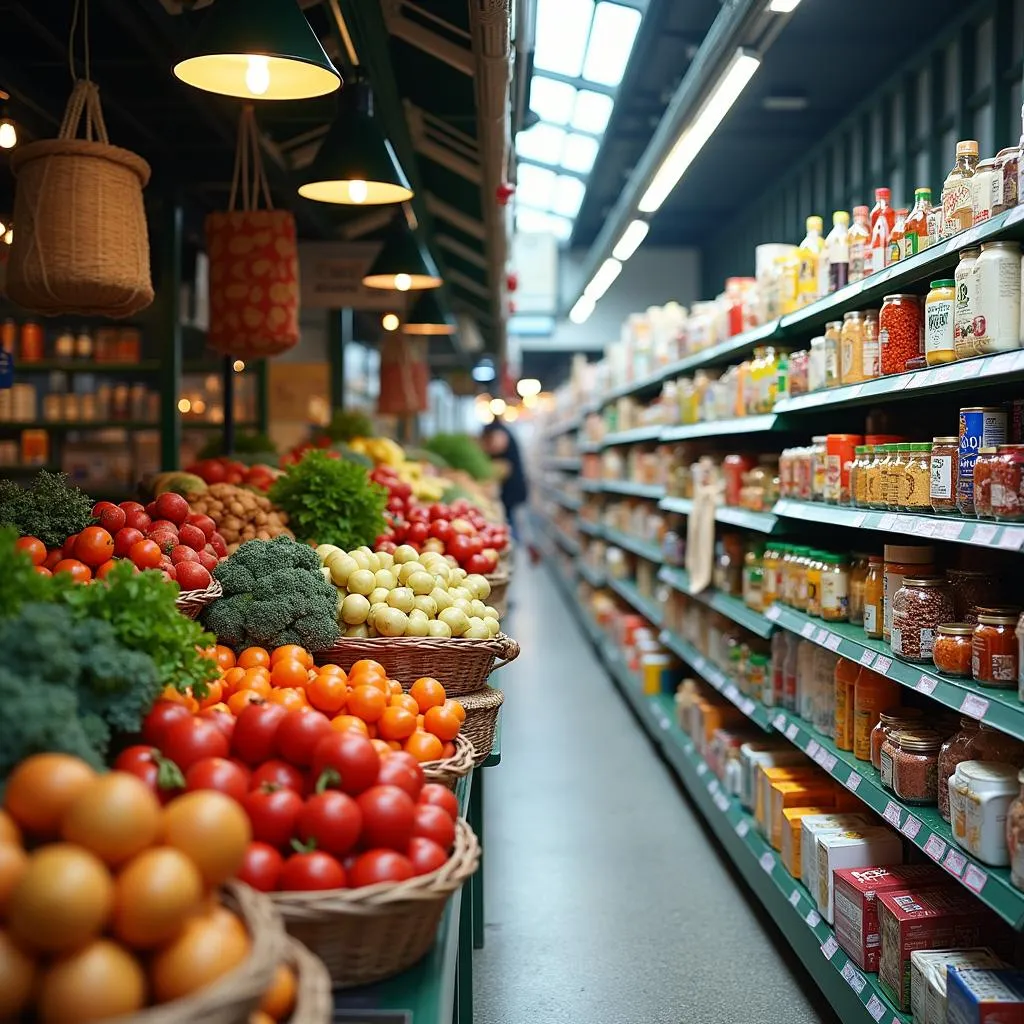Globalization’s effect on traditional food production is a recurring theme in IELTS Writing Task 2 essays. This topic has appeared in various forms over the past few years and is likely to continue being relevant in future tests. Its popularity stems from its global significance and the diverse perspectives it can elicit from test-takers. Based on past trends, we can expect to see questions related to this theme in approximately 15-20% of future IELTS Writing Task 2 prompts.
Nội dung bài viết
Let’s examine a specific question that has appeared in recent IELTS exams:
Some people say that globalization is making local foods less available and more expensive. To what extent do you agree or disagree with this statement?
Analyzing the Question
This question requires candidates to consider the impact of globalization on traditional food industries and express their opinion on whether it has reduced the availability and increased the cost of local foods. A well-structured response should:
- Clearly state the writer’s position (agree, disagree, or partially agree)
- Provide specific examples and explanations to support the argument
- Consider potential counterarguments
- Conclude by summarizing the main points and restating the overall stance
Now, let’s look at three sample essays of varying band scores to illustrate different approaches to this question.
Sample Essay 1 (Band 8-9)
Globalization has undoubtedly transformed the global food landscape, but I partially agree with the statement that it has made local foods less available and more expensive. While there are instances where this holds true, the reality is more nuanced, with globalization also bringing positive changes to local food production and consumption.
On one hand, globalization has indeed posed challenges to some local food industries. The influx of international food chains and products has created fierce competition for local producers, potentially driving up costs and reducing availability. For example, in many developing countries, traditional street food vendors struggle to compete with multinational fast-food chains, leading to a decline in the availability of authentic local cuisine. Additionally, the emphasis on export-oriented agriculture in some regions has led to a reduction in land devoted to local food crops, potentially increasing prices for domestic consumers.
However, it would be an oversimplification to claim that globalization uniformly negatively impacts local foods. In many cases, globalization has actually enhanced the visibility and value of local cuisines on the global stage. The increased interest in diverse culinary experiences has led to a resurgence in traditional food production in many areas. For instance, quinoa, once a staple food in the Andean region, has gained international popularity, leading to increased production and economic benefits for local farmers. Moreover, technological advancements and knowledge sharing facilitated by globalization have often improved local food production methods, potentially reducing costs and increasing availability.
Furthermore, globalization has expanded consumer choice, allowing for a blend of local and international options. While this may create competition, it also encourages local producers to innovate and improve their offerings, potentially leading to higher quality local foods. The rise of farmers’ markets and farm-to-table movements in many countries demonstrates a growing appreciation for local produce, often supported by consumers who have been exposed to diverse food cultures through globalization.
In conclusion, while globalization has certainly impacted local food industries, its effects are complex and not universally negative. The availability and cost of local foods depend on various factors, including local policies, consumer preferences, and how well local producers adapt to changing markets. To ensure the preservation and promotion of local foods in a globalized world, a balanced approach that leverages the benefits of global trade while supporting local food systems is essential.
 Globalization's impact on local food production
Globalization's impact on local food production
Sample Essay 2 (Band 6-7)
I partially agree with the statement that globalization is making local foods less available and more expensive. While globalization has had some negative impacts on local food production, it has also brought some benefits.
One way globalization has affected local foods is by increasing competition. Big international companies can produce food more cheaply, which can make it hard for local producers to compete. This might lead to some local foods becoming less common or more expensive. For example, in some countries, traditional markets are being replaced by supermarkets that sell more imported goods.
However, globalization has also had some positive effects on local food production. It has made it easier for local producers to sell their products to a wider market. This can actually increase the demand for local specialties and make them more valuable. For instance, foods like Italian olive oil or French cheese are now popular worldwide, which has helped local producers in those countries.
Another point to consider is that globalization has introduced new foods and cooking techniques to many places. This has led to interesting fusions of local and international cuisines. While this might change traditional eating habits, it also creates new local foods that combine global influences with local ingredients.
Globalization has also improved farming techniques in many places. Knowledge and technology from around the world can help local farmers produce more food more efficiently. This could potentially make some local foods more available and less expensive.
In conclusion, while globalization has created challenges for some local food producers, it has also opened up new opportunities. The impact on the availability and cost of local foods varies depending on the specific food and location. To protect local food cultures, it’s important for communities and governments to support local producers while also embracing the benefits of global trade.
Sample Essay 3 (Band 5-6)
I agree that globalization is making local foods less available and more expensive. This is happening in many countries around the world.
Firstly, globalization means big companies from other countries can sell their food everywhere. These companies often sell food cheaper than local producers. This makes it hard for local farmers and food makers to sell their products. Some local foods might disappear because of this.
Secondly, when local foods become less common, they can become more expensive. This is because fewer people are making them. For example, in my country, some traditional foods are now only available in special shops and they cost a lot more than before.
Another problem is that people are starting to prefer international foods. Many young people like to eat at fast food restaurants instead of eating traditional local foods. This means there is less demand for local foods, so fewer people make them.
However, globalization is not all bad for local foods. Some local foods become popular in other countries. This can be good for local producers who can sell their products to more people.
In conclusion, I think globalization is mostly making local foods less available and more expensive. But there are some good things too. Governments should try to protect local food producers to keep traditional foods available.
 Traditional vs global food choices
Traditional vs global food choices
Explanation of Band Scores
Band 8-9 Essay:
- Demonstrates a sophisticated understanding of the topic with a nuanced perspective
- Provides specific examples and well-developed arguments
- Uses a wide range of vocabulary and complex sentence structures accurately
- Has a clear and logical structure with cohesive paragraphs
- Addresses all parts of the question thoroughly
Band 6-7 Essay:
- Shows a good understanding of the topic with some depth in arguments
- Provides some examples, though they may be less specific or developed
- Uses a mix of simple and complex sentences with generally good vocabulary
- Has a clear overall structure, though some paragraphs may be less well-developed
- Addresses the main parts of the question, but may not explore all aspects in depth
Band 5-6 Essay:
- Presents a basic understanding of the topic with simple arguments
- Provides limited examples or explanations
- Uses mostly simple sentences and basic vocabulary, with some errors
- Has a basic structure, but paragraphs may lack clear focus or development
- Addresses the question, but may not fully explore all aspects or may be repetitive
Key Vocabulary to Remember
-
Globalization (noun) /ˌgləʊbəlaɪˈzeɪʃən/: The process by which businesses or other organizations develop international influence or start operating on an international scale.
-
Traditional (adjective) /trəˈdɪʃənl/: Existing in or as part of a tradition; long-established.
-
Availability (noun) /əˌveɪləˈbɪləti/: The quality of being able to be used or obtained.
-
Culinary (adjective) /ˈkʌlɪnəri/: Related to cooking or kitchens.
-
Indigenous (adjective) /ɪnˈdɪdʒənəs/: Originating or occurring naturally in a particular place; native.
-
Sustainability (noun) /səˌsteɪnəˈbɪləti/: The ability to be maintained at a certain rate or level.
-
Cuisine (noun) /kwɪˈziːn/: A style or method of cooking, especially as characteristic of a particular country, region, or establishment.
-
Fusion (noun) /ˈfjuːʒən/: The process or result of joining two or more things together to form a single entity.
-
Preservation (noun) /ˌprezəˈveɪʃən/: The action of preserving something.
-
Diversification (noun) /daɪˌvɜːsɪfɪˈkeɪʃən/: The action of making or becoming more diverse or varied.
In conclusion, the impact of globalization on traditional food production is a complex and multifaceted issue that requires careful consideration. While there are challenges posed by global competition and changing consumer preferences, there are also opportunities for local producers to reach wider markets and innovate. As this topic remains relevant to the IELTS exam, candidates should be prepared to discuss both the positive and negative aspects of globalization’s influence on local food industries.
For further practice, consider writing essays on related topics such as:
- The role of government in protecting local food traditions in a globalized world.
- The impact of international food standards on small-scale local producers.
- How globalization affects food security in developing countries.
We encourage readers to practice writing their own essays on this topic and share them in the comments section below. This active engagement will help improve your writing skills and prepare you for success in the IELTS Writing Task 2.


